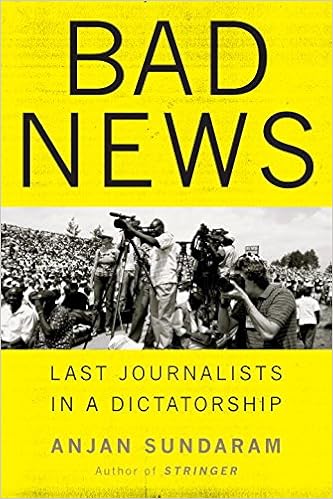“We have an oral culture,” he said. “People get nervous when you write. Writing also leaves proof. If you don’t write notes the world can be made different. People’s memories can always be questioned, molded.”

Holy hell, this book. While I may have gripes with the author here and there, Bad News: Last Journalists in a Dictatorship captures the claustrophobic atmosphere of journalism in Rwanda. Sundaram opens the book with a story of traveling down a road in Kigali and hearing an explosion. When he goes to investigate, he witnesses a clean-up in progress, shards of glass being swept from the street by officials. He asks one of them if this is where the explosion happened.
“The what?”
“The blast. I heard it down the hill.”
“No, no, you are imagining things.” He spoke slowly, shaking his head.
“What is that man sweeping, though?”
“We always clean the roads. . . . Listen carefully. Nothing happened here.”
If there is a constant through all my reading about oppressive regimes, it’s the substitution of the ruling regime’s preferred version of reality for the actual lived experience of the people. The dictatorship lives or dies by its ability to convince people of (or at least convince them to agree to) the worldview and history that it chooses to espouse.
For instance, in President Kagame’s version of events, his Tutsi army did not invade and destabilize the Democratic Republic of Congo. It committed no massacres, in the DRC or in Rwanda. How could it have? How could the nation’s savior, the liberating force that ended the genocide, have done this? Why would you ever repeat this kind of genocidal propaganda? Were you involved in the genocide, come to think of it? Is that why you’re saying these things?
Sundaram came to Rwanda as part of a program to train the few remaining free Rwandan journalists in how to find, research, and report on news stories in their country. From this vantage point, he witnessed the near-total breakdown of what little free journalism remained in a country where the president’s men intimidated, imprisoned, and even murdered any journalist who dared to stray from Kagame’s story of Rwandan peace, freedom, and prosperity.
It’s a chilling book, notwithstanding Sundaram’s occasional assumption that he Knows Best what these folks should be doing and choosing. Maybe my next Not a Dumb American post will be the Rwanda edition.